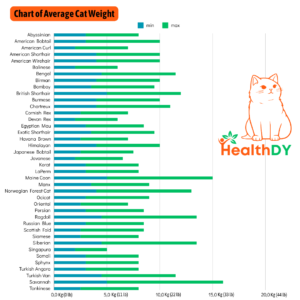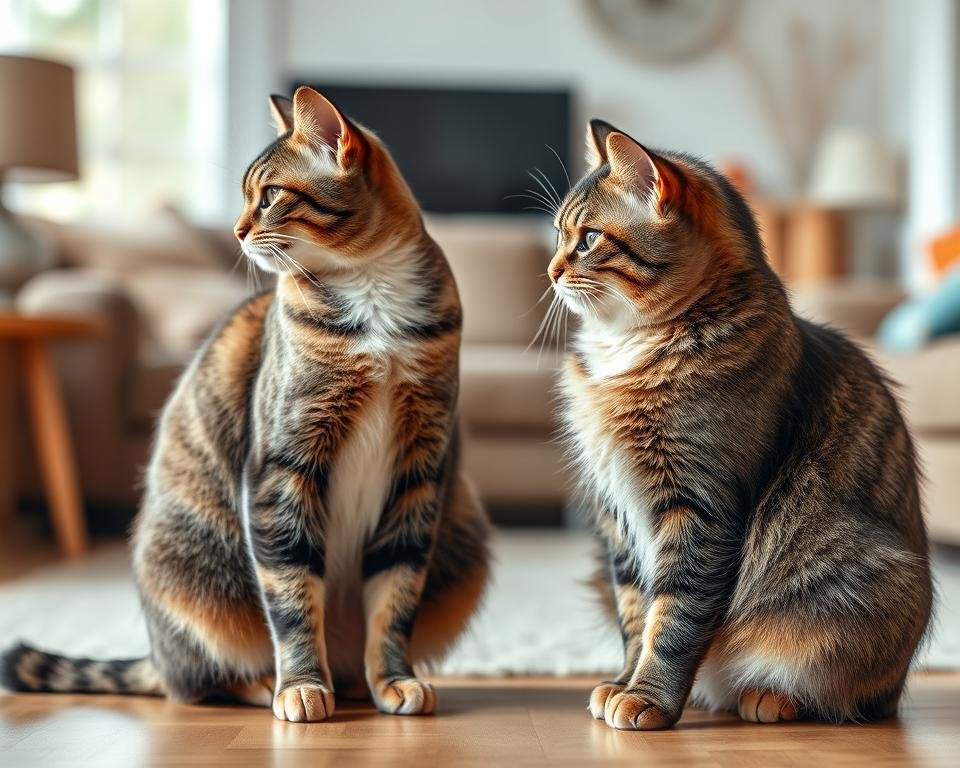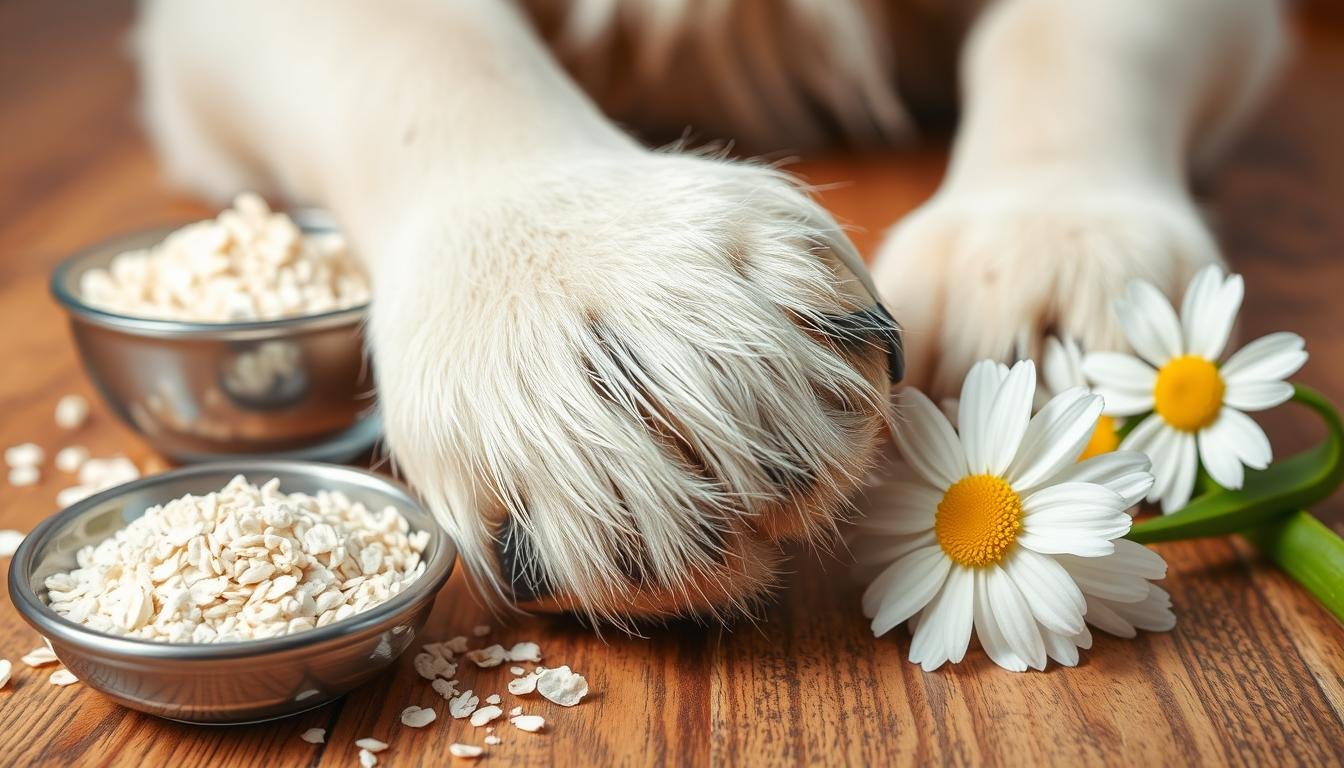Find the Average Weight of Your Cat’s Breed
The American Veterinary Medical Association (AVMA) called obesity a disease in 2018. They found that 59.5% of cats are either overweight or obese. This extra cat weight can lead to diabetes, urinary disease, arthritis, and even shorten their lives.
The perfect healthy cat weight is usually between 8-12 pounds. But, it can change based on the cat’s breed, body shape, and muscle. If a cat loses weight without reason, it could mean serious health problems. So, keeping an eye on a cat’s feline weight is very important.
Understanding Healthy Average Cat Weight Ranges

Keeping a cat at a healthy weight is key for their health. The average cat should weigh 8 to 10 pounds. But, different breeds can have different healthy weights.
Domestic Shorthair cats are usually healthy at 6 to 12 pounds. On the other hand, Maine Coon cats can be up to 20 pounds and be healthy too.
Factors Affecting Cat Weight
Many things can affect a cat’s weight. These include their age, breed, gender, and health history. As cats get older, their metabolism can slow down. This might lead to weight gain if they don’t change their diet and exercise.
Some breeds, like Munchkin cats, are smaller and weigh less. Others, like the British Shorthair, can weigh up to 18 pounds.
Body Frame and Muscle Mass Considerations
When checking a cat’s weight, look at their body frame and muscle mass. A cat with a bigger frame might weigh more than a smaller one. But, they can both be healthy.
Cats should have a slight hourglass shape from above. They should also have a small belly fat pad from the side. This shows they are in good shape.
“A healthy cat weight helps decrease the risk of developing diseases such as arthritis, high blood pressure, cancer, urinary bladder stones, type 2 diabetes, and cardiovascular disease.”
Cat Weight Chart (by Breed)
Average Cat Breed Weights
A cat weight chart can be a helpful tool for keeping track of your female cat’s health, especially if you’re monitoring for weight loss or weight gain. Female cats, like all cats, have unique weight ranges based on their breed and age, so comparing your cat’s weight to a chart can provide valuable insights.
Noticing slight changes in weight early on can make a big difference in preventing or addressing potential health issues. A cat weight chart helps you set healthy goals and identify if your cat’s weight loss is within a safe range, ensuring she stays active and well.
How Much Do Cats Weigh by Breed and Gender
Cats’ weights vary a lot based on their breed and gender. Smaller breeds like the Siamese can weigh 5-10 pounds. Larger breeds, like the Maine Coon, can weigh 10-25 pounds and be healthy. Male cats are usually bigger and heavier than females.
For instance, male Siamese cats weigh 11-15 pounds. Female Siamese cats weigh 8-12 pounds. Male Maine Coons can weigh up to 25 pounds, while females top out at 18 pounds. Spaying or neutering can also make cats gain weight over time.
It’s key to work with your vet to find your cat’s ideal weight. They can guide you on breed-specific weight ranges and help keep your cat healthy. Regular weigh-ins and monitoring can also spot health issues early.
“The International Cat Association recognizes more than 70 cat breeds, resulting in significant variations in ideal weights.”
Using the Body Condition Score System
Checking your cat’s body condition is key for their health. The Body Condition Score (BCS) system helps vets check a cat’s weight and shape. It uses a 9-point scale to see if your cat is at a good weight, too thin, or too heavy.
How to Assess Your Cat’s Body Condition
To check your cat’s body condition, feel their ribs under a thin layer of fat. You should be able to feel the ribs easily. Also, look for a slight hourglass shape from above and a small belly fat pad from the side.
Visual and Physical Evaluation Methods
Assessing a cat’s weight is mostly visual, but it’s tricky because of their fur. The best way is to use both visual checks and touch to find your cat’s true body condition score.
Understanding the 9-Point Scale
The BCS scale goes from 1 to 9, with 1 being very underweight and 9 being very overweight. A healthy cat should score between 4 and 5. Keeping an eye on your cat’s body condition helps spot health issues early and keeps them at a good weight.
Health Implications of Cat Weight
Obesity in cats is a big problem. It can lead to serious health issues. Cats that are overweight are more likely to get diabetes, arthritis, and urinary problems.
Worst of all, being obese can shorten a cat’s life by up to 5 years. On the other hand, losing weight without reason could mean there’s a serious health issue. This could be hyperthyroidism, kidney disease, or dental problems.
Keeping a cat at a healthy weight is key to their happiness and long life. Regular vet visits and watching their weight are important. This helps catch and manage health problems early.
By tackling cat obesity health risks and feline weight-related diseases early, cat owners can help their pets live better. This is all about effective Average cat weight management.
More than 50% of cats in North America are overweight. This is due to a lack of exercise, bad diets, and neutering. Knowing the risks of cat weight helps owners take action. This ensures their pets have a great quality of life.
Helping Overweight Cats Maintain a Healthy Weight
Keeping your cat at a healthy weight is key to ensuring a long, happy life. Overweight cats can face health risks like diabetes, joint problems, and heart disease. To help your cat maintain a healthy weight, start by monitoring portion sizes, choosing nutrient-rich, balanced cat food, and encouraging regular playtime. Small, gradual changes in diet and exercise can make a big difference. If your cat is already overweight, consider consulting your vet for a tailored weight-loss plan that suits your pet’s specific needs. With a bit of care and patience, your cat can reach and keep a healthy weight.
FAQ
What is the average weight for domestic cats?
Healthy cats usually weigh between 8-12 pounds. This can change based on their breed, body size, and muscle.
What factors affect a cat’s weight?
A cat’s weight is influenced by their age, breed, gender, and health history. Their body shape and muscle also play a big role in their weight.
How do cat weights vary by breed and gender?
Smaller breeds like Siamese cats are healthy at 5-10 pounds. Larger breeds, like Maine Coons, can weigh 10-25 pounds. Male cats are usually bigger and heavier than females.
How can I use the Body Condition Score system to assess my cat’s weight?
The Body Condition Score (BCS) system rates cats from 1-9, with 4-5 being perfect. To check your cat, feel their ribs and look for a slight waist. Also, check for a small belly fat pad.
What are the health implications of a cat being overweight or underweight?
Being overweight can lead to serious health problems in cats. These include diabetes, arthritis, and urinary issues. It can also shorten their life. Losing weight without reason can signal serious health issues like hyperthyroidism or kidney disease.



